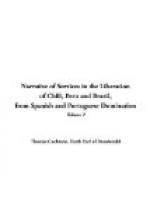Unwilling, however, to injure this fine city, I sent in proposals for capitulation, giving permission to the revolutionary leaders to depart unpunished, together with their property, provided they quitted the Brazilian territory—demanding in return the surrender of the forts, ships of war, gunboats, &c. as well as of all public property. In order to prevent waste of time in correspondence, I proposed to Carvalho to meet me on board any neutral ship of war, pledging my honour as to his being permitted to return in safety; he nevertheless declined the interview, proposing in return to meet me on shore on an island near the town but—as after his insulting proposal, I could have no confidence in his honour, this was of course declined.
Still anxious to avoid extremities—from which, after the threats made, I could not consistently refrain—I again wrote to Carvalho, that, had he possessed the means of distinguishing between the intentions of the Emperor, and the proceedings of a foreign faction, he would not have been in arms against His Imperial Majesty, by adherence to whom Brazil could alone be saved from that anarchy and confusion into which Mexico and other South American States had fallen through individual rivalry and the ignorance of their popular assemblies. I further pointed out to him, that if, by procrastination I was compelled to bombard the city, the popular clamour against the insurgent authorities might be followed by melancholy proof to himself how quickly political adventurers may be abandoned or betrayed in the hour of danger, and that he had better yield to reason, what he could not prevent my effecting by force.
By writers who could not have known anything of the circumstances—which exist only in my own documents—I have been blamed for this tone of moderation towards the revolutionary President. There were two valid reasons for this course; first, that the conduct of the Pernambucans admitted of great palliation, seeing that the distractions resulting from the Portuguese faction in the administration at Rio de Janeiro had been ignorantly construed into acts of His Imperial Majesty—so that the injured people argued that it would have been better for them to have remained a colony of Portugal, than a colony of the Government at Rio de Janeiro—this mode of reasoning not being very far wrong. Secondly—and this fully accounts for the moderation complained of—I knew, from the most authentic sources that, in case of attack on the city, Carvalho had determined to retire into the interior, there to carry on civil war by enlisting the negro population under his standard; to avert which, I considered that moderation was the best course to induce him and his partisans to quit the empire, which would thus have been well rid of them.




